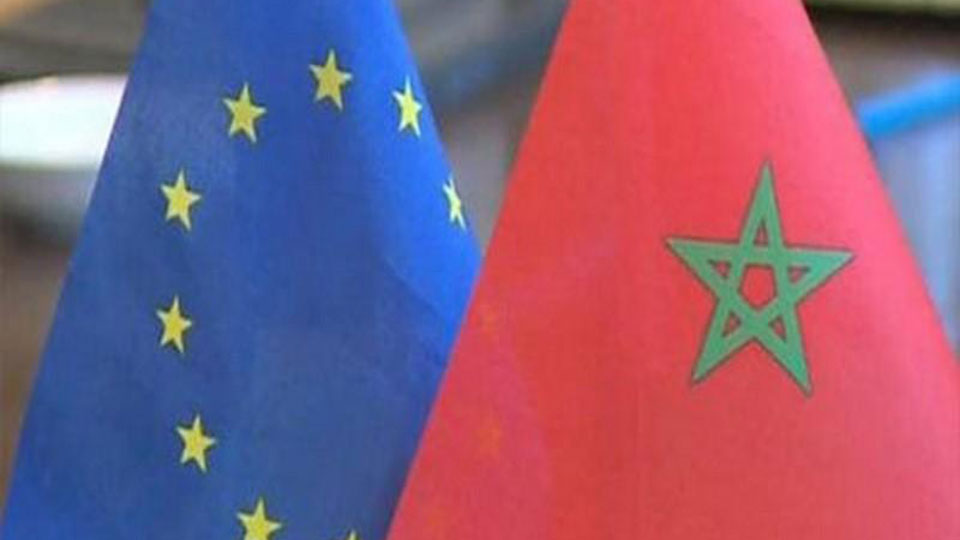O Conselho vota sobre a proposta de decisão da Comissão que altera o Acordo Euro-Mediterrânico com o Reino de Marrocos / The Council votes on the Commission’s proposal for a decision amending the Euro-Mediterranean Agreement with the Kingdom of Morocco.
PortguêsEnglish
Em 16 de Julho, o Conselho adoptou uma decisão relativa à extensão das preferências pautais no Acordo de Associação com Marrocos no Sahara Ocidental. Segundo a Comissão, a decisão está em conformidade com o acórdão do Tribunal de Justiça da UE sobre o acordo de liberalização dos produtos agrícolas e outros produtos, de 21 de Dezembro de 2016.
Recordamos que, em 29 de maio de 2017, o Conselho autorizou a Comissão a encetar negociações com vista a fornecer uma base jurídica para a concessão de preferências aos produtos originários do Sahara Ocidental na sequência do acórdão de 21 de Dezembro de 2016 no processo C-104/16 P, em que o Tribunal de Justiça da União Europeia tinha decidido que o Acordo de Associação e o acordo de liberalização celebrado entre a UE e Marrocos não se aplicavam ao Sahara Ocidental.
Duas rodadas de negociações foram realizadas. A primeira foi realizada em 15 e 16 de Junho de 2017, a segunda em 18 de Julho de 2017. Os principais negociadores iniciaram o projecto de acordo em 31 de Janeiro de 2018.
Esta decisão é motivada de acordo com a Comissão Europeia por dois objectivos principais.
Por um lado, o acordo garantiria que os produtos do Sahara Ocidental pudessem ser exportados para a UE com preferências comerciais e, assim, “favorecer” o desenvolvimento do Sahara Ocidental. Por conseguinte, tais medidas devem evitar que o Sahara Ocidental esteja numa situação concorrencial desfavorável, perdendo assim oportunidades de investimento comparativamente com os países vizinhos, que beneficiam de preferências tarifárias de diferentes formas (acordos de associação ou quadro do Sistema de Preferências Generalizadas).
Por outro lado, deve permitir à UE reforçar a sua parceria com Marrocos. Por último, este acordo alterado deve também indicar “o caminho a seguir para o acordo de pescas UE-Marrocos nos próximos meses”.
Este novo acordo permitiria, assim, regularizar o pedido – de facto – antes de 21 de Dezembro de 2016, data da decisão do TJUE, de preferências para os produtos marroquinos certificados como Sahara Ocidental. Nenhuma nova preferência comercial será concedida a Marrocos, bem como ao Sahara Ocidental, em relação àquelas de que beneficiou antes de 21 de Dezembro de 2016, “sendo o objectivo simplesmente alargar a área geográfica coberta pelas preferências e não alterar o volume ou os produtos abrangidos pelas preferências”.
Esta análise da Comissão Europeia, que, recorde-se, detém o monopólio da iniciativa legislativa, não responde em absoluto ao acórdão do Tribunal.
É certo que a decisão votada recorda, nos seus considerandos, que a União considera o Sahara Ocidental como um território não autónomo e que nunca reconheceu qualquer soberania de Marrocos sobre o Sahara Ocidental.
Por conseguinte, a conclusão deveria ser simples: o Sahara Ocidental não pode fazer parte do território do Reino de Marrocos na acepção do artigo 94º do Acordo de Associação. Portanto, os acordos de associação e liberalização não devem ser aplicáveis a ele.
No entanto, a decisão votada sobre uma proposta da Comissão viola esta conclusão muito simples, que já foi induzida pelo raciocínio do TJUE no seu acórdão supracitado.
A Comissão está ainda a desviar-se das regras do direito internacional, pelo menos neste momento e na pendência de uma solução do conflito dentro da estrutura da ONU.
Ao limitar o âmbito da alteração do Acordo aos produtos que já beneficiam de uma preferência pautal, a Comissão propõe uma leitura singular e perigosa por, pelo menos, três razões.
Por um lado, essa leitura equivale a admitir que a intenção da União é a de implementar esses acordos de uma forma incompatível com os princípios da autodeterminação e o efeito relativo dos Tratados – embora a UE reitere a necessidade de respeitar estes princípios.
Por outro lado, a interpretação de que o desenvolvimento económico do Sahara Ocidental aumentaria a renda económica da “população” só fortaleceria a ocupação do território do Sahara Ocidental, aliciando ainda mais colonos marroquinos a se instalarem no território ocupado. Ao fazê-lo, a UE apoiaria a ocupação marroquina.
Por último, esta leitura apenas valida a política marroquina de violação maciça dos direitos humanos dos saharauis nos territórios ocupados, o que é claramente contrário à Carta dos Direitos Fundamentais da União Europeia e ao artigo 6.º do Tratado da União Europeia, que obriga as instituições a respeitar os direitos humanos ” quando implementam o direito da União “.
A este respeito, a Comissão, na sua proposta votada, afirmou:
De um modo geral, no que se refere ao impacto esperado de uma extensão das preferências pautais aos produtos do Sahara Ocidental na situação dos direitos humanos nesse território, convém, por analogia, raciocinar o efeito do Acordo de Associação UE-Marrocos sobre a situação dos direitos humanos em Marrocos como o acordo promove a convergência regulamentar para as normas da UE em vários campos, há um efeito positivo indirecto, particularmente no que diz respeito às condições de trabalho (por exemplo, medidas de segurança), legislação laboral (por exemplo, protecção das crianças), medidas fitossanitárias ou defesa do consumidor”.
Esta motivação sumária, que supostamente cumpre os requisitos da cláusula social transversal do artigo 9.º do TFUE, não tem em conta as violações maciças documentadas por organizações não governamentais internacionais, como a Amnesty International ou a Human Rights Watch.
Não há dúvida de que um exame real e detalhado desse “aspecto” levaria a outra conclusão.
De facto, de acordo com fontes geopolíticas publicamente disponíveis, os saharauis que vivem no território ocupado continuam a ser alvo de repressão; as autoridades marroquinas usam frequentemente força excessiva e iniciam processos criminais de motivação política contra os manifestantes; e estas fontes também destacam a prática de tortura e maus-tratos de activistas saharauis em detenção.
A Comissão também não considerou útil questionar o apartheid social e económico sofrido pelos Saharauis que vivem no território ocupado ou a discriminação e violência contra as crianças saharauis, o que também é amplamente documentado.
A Comissão, guardiã dos Tratados, já não desempenha o seu papel quando se trata de evitar perturbar “o fluxo do comércio”. Deverão os princípios gerais da segurança jurídica e das expectativas legítimas, que exigem um grau de estabilidade para os operadores económicos, ser utilizados para validar uma prática ilegal contrária ao direito internacional?
A União deveria finalmente dar o exemplo da posição de Estados como os Estados Unidos da América, a República da Islândia, o Reino da Noruega e a Confederação Suíça, que consideram que o Sahara Ocidental não é abrangido no âmbito de aplicação dos seus livre acordos comerciais com o Reino de Marrocos.
O Conselho transmitiu a decisão ao Parlamento Europeu, nos termos do artigo 218.º do Tratado sobre o Funcionamento da União Europeia, com o objetivo de obter o seu consentimento.
O Parlamento Europeu pode, se assim o desejar, apresentar um pedido de parecer ao TJUE, mesmo que as conclusões do caso iniciado pela Frente Polisario sejam perfeitamente claras.
Por último, há que salientar que o acórdão proferido em 27 de Fevereiro de 2018 pelo Tribunal de Justiça da União Europeia no processo C-266/16, relativo ao Acordo de Parceria no domínio da pesca entre a União Europeia e Marrocos, é um tema separado da questão, e ao acesso ao mercado referido no Acordo de Associação e, portanto separado dessa decisão. No entanto, parece que a Comissão, que irá conduzir as negociações por mandato do Conselho, já encontrou um terreno comum com Marrocos, no passado dia 20 de Julho.
O mesmo problema irá, por conseguinte, surgir de novo: quando é que a UE deixará de incentivar o Reino de Marrocos a violar os direitos humanos?
On 16 July the Council adopted a decision on the extension of tariff preferences in the Association Agreement with Morocco in Western Sahara. According to the Commission, the decision is in line with the judgment of the Court of Justice of the EU on the liberalization agreement on agricultural and other products of 21 December 2016.
As a reminder, on 29 May 2017, the Council authorized the Commission to open negotiations with a view to providing a legal basis for granting preferences to products originating in Western Sahara following the judgment of 21 December 2016 in the case C-104/16 P 3, in which the Court of Justice of the European Union had ruled that the Association Agreement and the liberalization agreement concluded between the EU and Morocco did not apply to Western Sahara.
Two rounds of negotiations took place. The first was held on June 15 and 16, 2017, the second on July 18, 2017. The Chief Negotiators initiated the draft agreement on January 31, 2018.
This decision is motivated according to the European Commission by two main objectives.
On the one hand, the agreement would ensure that products from Western Sahara could be exported to the EU with trade preferences and thus “favor” the development of Western Sahara. Therefore, such measures should prevent Western Sahara from being in an unfavorable competitive situation, and thereby lose investment opportunities, compared to neighboring countries, which benefit from tariff preferences in different ways (association agreements or framework of the Generalized System of Preferences)”.
On the other hand, it should allow the EU to strengthen its partnership with Morocco. Finally, this amended agreement should also show “the way forward for the EU-Morocco fisheries agreement in the coming months”.
This new agreement would thus make it possible to regularize the application – de facto – before December 21, 2016, the date of the CJEU ruling, of preferences to Moroccan Western Sahara certified products. No new commercial preference will be granted to Morocco, as well as to Western Sahara in relation to those which it actually enjoyed before 21 December 2016, “the objective being simply to extend the geographical area covered by the preferences and not to “change the volume or the products covered by the preferences”.
This analysis of the European Commission, which, it must be remembered, holds the monopoly of the legislative initiative, does not answer at all to the judgment of the Court.
Admittedly, the decision voted recalls, in its recitals, that the Union considers Western Sahara as a non-autonomous territory, and that it has never recognized any sovereignty over Western Sahara.
The conclusion should therefore be simple: Western Sahara can not be part of the territory of the Kingdom of Morocco within the meaning of Article 94 of the Association Agreement. Therefore, association and liberalization agreements should not be applicable to it.
However, the decision voted on a proposal from the Commission violates this very simple conclusion, which has already been induced by the reasoning of the CJEU in its aforementioned judgment.
The Commission is still diverting the rules of international law, at least for the moment, according to it, and pending a settlement of the conflict within the UN framework.
By limiting the scope of the amendment of the Agreement to products already enjoying a tariff preference, the Commission proposes a singular and dangerous reading for at least three reasons.
On the one hand, that reading amounts to admitting that the Union’s intention is to implement those agreements in a manner incompatible with the principles of self-determination and the relative effect of the Treaties – even though the EU reiterates the need to respect these principles.
On the other hand, the interpretation that the economic development of Western Sahara would increase the economic income of the “population” would only strengthen the occupation of the territory of Western Sahara by pushing Moroccan citizens to settle in the occupied territory. In doing so, the EU would support the Moroccan occupation.
Finally, this reading only validates the Moroccan policy of massive violation of Saharawi human rights in the occupied territories, which is clearly contrary to the EU Charter of Fundamental Rights and Article 6 of the Treaty on European Union which obliges the institutions to respect human rights “when they implement Union law”.
In this regard, the Commission, in its voted proposal, stated:
In general, with regard to the expected impact of an extension of tariff preferences to Western Sahara products on the human rights situation in that territory, it is appropriate to reason by analogy with the effect of the EU-Morocco Association Agreement on the situation of human rights in Morocco as the agreement promotes regulatory convergence towards EU standards in various fields, there is an indirect positive effect , particularly with regard to working conditions (eg safety measures), labor legislation (eg child protection), phytosanitary measures or consumer protection”.
This summary motivation, which is supposed to meet the requirements of the transversal social clause in Article 9 TFEU, does not take into account the massive violations documented by NGOs such as Amnesty International or Human Rights Watch.
There is no doubt that a real and detailed examination of this “subject” would have led to another conclusion.
Indeed, according to publicly available geopolitical sources, Saharawis living in occupied territory continue to be targeted for repression; that the Moroccan authorities often use excessive force, and initiate criminal prosecution of political motives against the protesters; that these sources also highlight the practice of torture and ill-treatment of Saharawi activists in detention.
The Commission also did not consider it useful to question the social and economic apartheid suffered by Saharais living in the occupied territory or the discrimination and violence against Saharawi children, which is also widely documented.
The Commission, guardian of the Treaties, no longer plays its role when it comes to avoiding disrupting “the flow of trade”. Should the general principles of legal certainty and legitimate expectations that require a degree of stability for economic operators be used to validate an illegal practice that is contrary to international law?
The Union should finally take an example of the position of States such as the United States of America, the Republic of Iceland, the Kingdom of Norway and the Swiss Confederation, which consider that Western Sahara does not fall within the scope of application of their free trade agreements with the Kingdom of Morocco.
The Council has forwarded the decision to the European Parliament, pursuant to Article 218 of the Treaty on the Functioning of the European Union, for the purpose of obtaining its consent.
The European Parliament may, if it so wishes, submit a request for an opinion to the CJEU, even if the conclusions of the case initiated by the Polisario Front are perfectly clear.
Finally, it should be pointed out that the judgment delivered on 27 February 2018 by the Court of Justice of the European Union in Case C-266/16 concerns the Fisheries Partnership Agreement between the European Union and Morocco, is a separate topic from the issue of market access referred to in the Association Agreement and therefore from that decision. However, it seems that the Commission which will conduct the negotiations by mandate of the Council would already find common ground with Morocco, last 20th of July.
The same problem will therefore arise again: when will the EU stop encouraging the Kingdom of Morocco to violate human rights?
Por PUSL/ Tornado

Receba a nossa newsletter
Contorne o cinzentismo dominante subscrevendo a Newsletter do Jornal Tornado. Oferecemos-lhe ângulos de visão e análise que não encontrará disponíveis na imprensa mainstream.



